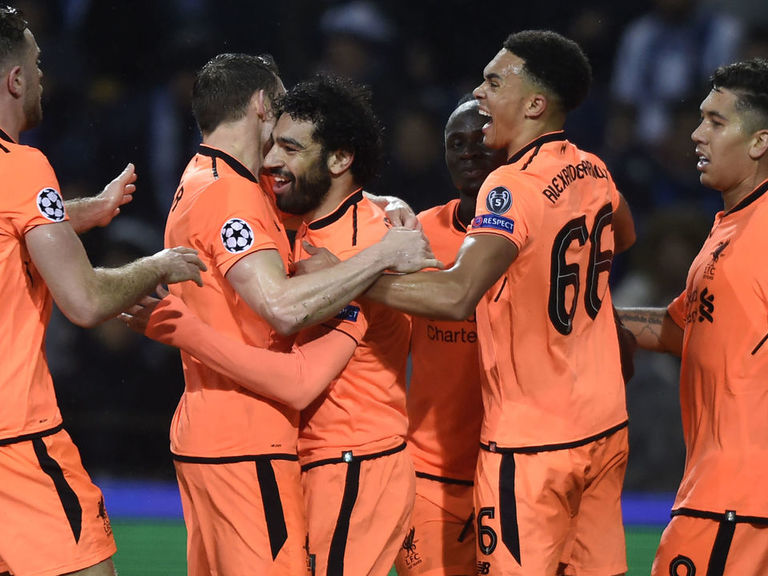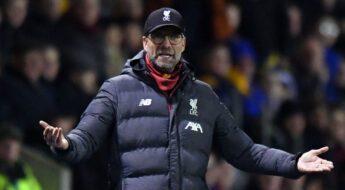Slice and dice: Why Liverpool is so successful pressing and countering

Jurgen Klopp couldn’t ask for more from his Liverpool players on Wednesday night. They won virtually every important battle in midfield against Porto, scoring five goals while also keeping a third clean sheet in four matches.
It was also another reminder of how lethal Liverpool can be. Combining a rigorous work ethic with a philosophy of gegenpressing, the team’s made a habit of tearing opponents apart. Including the 5-0 undressing at the Estadio Dragao, Liverpool has won seven matches by four goals or more in all competitions.
It helped that Liverpool netted twice before the 30-minute mark, putting the onus on Porto to throw another man forward. The away side could then afford to sit back, pick the right moments, and exploit the spaces left behind.
‘They can sit in and counter’
Wary of Liverpool’s counter-attacking prowess, most teams would prefer to soak up the pressure and nick something for themselves on the break. But because Liverpool profits from such good starts, opponents often have to abandon their defensive shell in order to chase the game. And that’s risky.
After conceding a bunch of leads this season – including a 3-0 half-time advantage against Sevilla – Klopp’s players have now shown they can kick on.
“The one thing they learned after Sevilla is game management,” former Liverpool defender Stephen Warnock told BBC Radio 5 Live. “They know they don’t have to press once they are a few goals up. They can sit in and counter, and that’s another side to Klopp’s team we’re seeing.”
It’s no coincidence that Liverpool tends to win when it scores early – which is something that happens a lot. The Reds lead the Premier League with 19 goals in the first 30 minutes of matches, and also set the pace in the Champions League with 12 tallies in that bracket.
Scoring early, in other words, is the way Liverpool coaxes a reaction.
Better without possession
The equation changes when Liverpool is asked to break opponents down. It’s much more difficult for the Merseyside outfit to navigate through two banks of four, as seen against the likes of Burnley and West Brom. In fact, Liverpool has won just three out of the eight Premier League matches in which it controlled 60 percent or more possession.
| Date | Opponent | Possession | Result |
|---|---|---|---|
| Aug. 19 | Crystal Palace | 62% | 1-0 win |
| Sept. 16 | Burnley | 63% | 1-1 |
| Oct. 1 | Newcastle | 60% | 1-1 |
| Oct. 28 | Huddersfield | 64% | 3-0 win |
| Dec. 10 | Everton | 66% | 1-1 |
| Dec. 13 | West Brom | 62% | 0-0 |
| Jan. 22 | Swansea City | 64% | 1-0 loss |
| Jan. 30 | Huddersfield | 63% | 3-0 win |
Liverpool is unlike Manchester City in this sense, weaker at probing and finding openings with world-class passes. Its game is instead based on linear play, with Georginio Wijnaldum usually feeding speed merchants Roberto Firmino, Mohamed Salah, and Sadio Mane. The goal-happy trio only needs a few touches to do substantial damage. Liverpool just isn’t as comfortable with more of the ball, and that’s why Jose Mourinho and Antonio Conte deferred possession when Manchester United and Chelsea visited Anfield earlier in the season. Both earned draws as a result.
Pressing works
But Liverpool can and will get its way. With the industrious Firmino pressing from the front and the likes of Wijnaldum winning second balls, the Reds’ pressing makes opponents uncomfortable.
The win at Porto required a similar display of concentration, as well as incredible industry. The much-maligned Dejan Lovren led the way, stepping in to collect goalkeeper Jose Sa’s errant throw and spark Liverpool’s opening drive. James Milner, who’s always ready to put in a shift, won a pair of duels ahead of Liverpool’s second and third goals. And then Mane, in the midst of a commanding hat-trick performance, intercepted a short pass in the middle of the pitch to set up his team’s fourth.
Asked if it was the perfect performance, Klopp said: “Yes. You could say that of course.”




